学校是否扼杀创造力 演讲稿
学校扼杀了学生的创造力?Ken Robinson Ted英语演讲视频中英字幕,英语文本

演讲稿英语文本:Good morning. How are you? It's been great, hasn't it? I've been blown away by the whole thing. In fact, I'm leaving.There have been three themes, haven't there, running through the conference, which are relevant to what I want to talk about.One is the extraordinary evidence of human creativity in all of the presentations that we've had and in all of the people here. Just the variety of it and the range of it.The second is, that it's put us in a place where we have no idea what's going to happen, in terms of the future, no idea how this may play out.I have an interest in education -- actually, what I find is, everybody has an interest in education; don't you? I find this very interesting. If you're at a dinner party, and you say you work in education -- actually, you're not often at dinner parties, frankly, if you work in education, you're not asked. And you'll never ask back, curiously. That's strange to me. But if you are, and you say to somebody, you know, they say, "What do you do," and you say you work in education, you can see the blood run from their face. They're like, "Oh my god," you know, "why me? My one night out all week." But if you ask people about their education, they pin you to the wall. Because it's one of those things that goes deep with people, am I right?, like religion, and money, and other things.I have a big interest in education, and I think we all do, we have a huge vested interest in it, partly because it's education that's meant to take us into this future that we can't grasp.If you think of it, children starting school this year will be retiring in 2065. Nobody has a clue, despite all the expertise that's been on parade for the past four days, what the world will look like in five years' time. And yet we're meant to be educating them for it. So the unpredictability, I think, is extraordinary.And the third part of this is that we've all agreed nonetheless on the really extraordinary capacity that children have, their capacities for innovation. I mean, Sirena last night was a marvel, wasn't she, just seeing what she could do. And she's exceptional, but I think she's not, so to speak, exceptional in the whole of childhood. What you have there is a person of extraordinary dedication who found a talent. And my contention is, all kids have tremendous talents and we squander them, pretty ruthlessly.So I want to talk about education and I want to talk about creativity. My contention is that creativity now is as important in education as literacy, and we should treat it with the same status. [applause] Thank you.That was it, by the way, thank you very much. Soooo, 15 minutes left. Well, I was born.I heard a great story recently, I love telling it, of a little girl who was in a drawing lesson, she was6 and she was at the back, drawing, and the teacher said this little girl hardly paid attention, and in this drawing lesson she did. The teacher was fascinated and she went over to her and she said, "What are you drawing?" and the girl said, "I'm drawing a picture of God." And the teacher said, "But nobody knows what God looks like." And the girl said, "They will in a minute."When my son was 4 in England -- actually he was 4 everywhere, to be honest; if we're being strict about it, wherever he went, he was 4 that year -- he was in the nativity play. Do you remember the story? No, it was big, it was a big story. Mel Gibson did the sequel, you may have seen it, "Nativity II." But James got the part of Joseph, which we were thrilled about. We considered this to be one of the lead parts. We had the place crammed full of agents in T-shirts: "James Robinson IS Joseph!" He didn't have to speak, but you know the bit where the three kings come in. They come in bearing gifts, and they bring gold, frankincense and myrrh. This really happened -- we were sitting there and we think they just went out of sequence, we talked to the little boy afterward and we said, "You OK with that" and he said "Yeah, why, was that wrong?" -- they just switched, I think that was it. Anyway, the three boys came in, little 4-year-olds with tea towels on their heads, and they put these boxes down, and the first boy said, "I bring you gold." The second boy said, "I bring you myrhh." And the third boy said, "Frank sent this."What these things have in common is that kids will take a chance. If they don't know, they'll have a go. Am I right? They're not frightened of being wrong.Now, I don't mean to say that being wrong is the same thing as being creative. What we do know is, if you're not prepared to be wrong, you'll never come up with anything original. If you're not prepared to be wrong. And by the time they get to be adults, most kids have lost that capacity. They have become frightened of being wrong.And we run our companies like this, by the way, we stigmatize mistakes. And we're now running national education systems where mistakes are the worst thing you can make.And the result is, we are educating people out of their creative capacities.Picasso once said this, he said that all children are born artists. The problem is to remain an artist as we grow up. I believe this passionately, that we don't grow into creativity, we grow out of it. Or rather we get educated out of it. So why is this?I lived in Stratford-on-Avon until about five years ago, in fact we moved from Stratford to Los Angeles, so you can imagine what a seamless transition this was. Actually we lived in a place called Snitterfield, just outside Stratford, which is where Shakespeare's father was born. Were you struck by a new thought? I was. You don't think of Shakespeare having a father, do you? Do you? Because you don't think of Shakespeare being a child, do you? Shakespeare being 7? I never thought of it. I mean, he was 7 at some point; he was in somebody's English class, wasn't he? How annoying would that be? "Must try harder." Being sent to bed by his dad, you know, to Shakespeare, "Go to bed, now," to William Shakespeare, "and put the pencil down. And stop speaking like that. It's confusing everybody."Anyway, we moved from Stratford to Los Angeles, and I just want to say a word about the transition, actually. My son didn't want to come. I've got two kids, he's 21 now, my daughter's 16; he didn't want to come to Los Angeles. He loved it, but he had a girlfriend in England. This was the love of his life, Sarah. He'd known her for a month. Mind you, they'd had their fourthanniversary, because it's a long time when you're 16. Anyway, he was really upset on the plane, and he said, "I'll never find another girl like Sarah." And we were rather pleased about that, frankly, because she was the main reason we were leaving the country.But something strikes you when you move to America and when you travel around the world: every education system on earth has the same hierarchy of subjects. Every one, doesn't matter where you go, you'd think it would be otherwise but it isn't. At the top are mathematics and languages, then the humanities, and the bottom are the arts. Everywhere on earth.And in pretty much every system too, there's a hierarchy within the arts. Art and music are nomally given a higher status in schools than drama and dance. There isn't an education system on the planet that teaches dance every day to children the way we teach them mathematics. Why? Why not? I think this is rather important. I think maths is very important but so is dance. Children dance all the time if they're allowed to, we all do. We all have bodies, don't we? Did I miss a meeting?Truthfully what happens is, as children grow up we start to educate them progressively from the waist up. And then we focus on their heads. And slightly to one side.If you were to visit education as an alien and say what's it for, public education, I think you'd have to conclude, if you look at the output, who really succeeds by this, who does everything they should, who gets all the brownie points, who are the winners。
关于学校扼杀创造力的演讲

Sir Ken Robinson, who is always interested in education as everyone, gave us a unique point of view on Ted talks: Schools kill creativity.There are 3 themes in his lecture: First, humans hold the variety of and range of creativity. Second, as we are uncertain of the future, we have the obligation to educate children so as to be ready to the challenge of the future. Third, every child holds an extraordinary creativity which is likely to be buried by adults. As they are not afraid of making mistakes, they can do something creative. But as children grow up, they lose their creativity gradually and become timid. So the author holds the idea we should help to keep the children's creativity. Ken Robinson considers that schools kill creativity. He found it surprisingly that every state's education system share the same pyramid of subjects, even the pyramid exists in the interior of the subject. The purpose of global public education is to train college professor, but they are just a form of lifestyle. Since the 19th century, for meeting the demand for industrialization, the education which regards fostering academic ability as the only idea came to emerge. The foundation of the pyramid is rooted in two important methods: utility and academic ability. As in the next 30 years, the number of the population of graduates is the most, a new phenomenon will occur: degrees aren't worth anything. So, we'd better recreate our view of intelligence, it consists of diversity, dynamic and distinction. The author thinks our only hope of the future is to create a new conception of human ecology, only by doing this, can we know about the abundance of human ability.As the author said: "We have to rethink the fundamental principles on which we're educating our children". The traditional education kills creativity. Our job is to help children to overcome challenges, not to bury their creativity.。
英语演讲_Do_schools_kill_creativity教育扼杀创造力吗
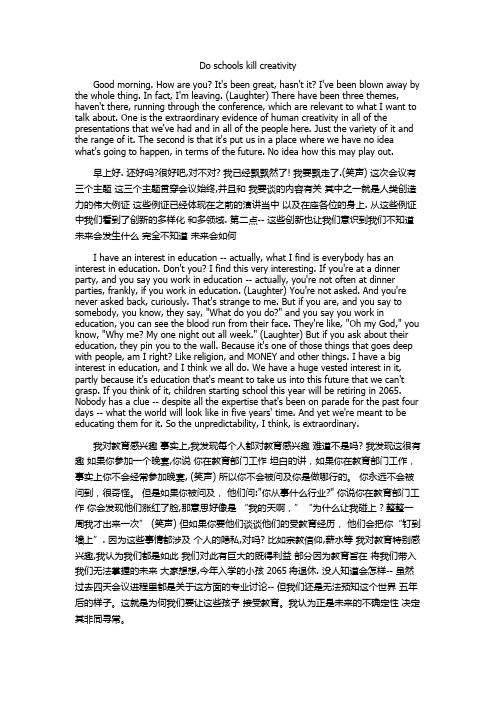
Do schools kill creativityGood morning. How are you? It's been great, hasn't it? I've been blown away by the whole thing. In fact, I'm leaving. (Laughter) There have been three themes, haven't there, running through the conference, which are relevant to what I want to talk about. One is the extraordinary evidence of human creativity in all of the presentations that we've had and in all of the people here. Just the variety of it and the range of it. The second is that it's put us in a place where we have no idea what's going to happen, in terms of the future. No idea how this may play out.早上好. 还好吗?很好吧,对不对? 我已经飘飘然了! 我要飘走了.(笑声) 这次会议有三个主题这三个主题贯穿会议始终,并且和我要谈的内容有关其中之一就是人类创造力的伟大例证这些例证已经体现在之前的演讲当中以及在座各位的身上. 从这些例证中我们看到了创新的多样化和多领域. 第二点-- 这些创新也让我们意识到我们不知道未来会发生什么完全不知道未来会如何I have an interest in education -- actually, what I find is everybody has an interest in education. Don't you? I find this very interesting. If you're at a dinner party, and you say you work in education -- actually, you're not often at dinner parties, frankly, if you work in education. (Laughter) You're not asked. And you're never asked back, curiously. That's strange to me. But if you are, and you say to somebody, you know, they say, "What do you do?" and you say you work in education, you can see the blood run from their face. They're like, "Oh my God," you know, "Why me? My one night out all week." (Laughter) But if you ask about their education, they pin you to the wall. Because it's one of those things that goes deep with people, am I right? Like religion, and MONEY and other things. I have a big interest in education, and I think we all do. We have a huge vested interest in it, partly because it's education that's meant to take us into this future that we can't grasp. If you think of it, children starting school this year will be retiring in 2065. Nobody has a clue -- despite all the expertise that's been on parade for the past four days -- what the world will look like in five years' time. And yet we're meant to be educating them for it. So the unpredictability, I think, is extraordinary.我对教育感兴趣事实上,我发现每个人都对教育感兴趣难道不是吗? 我发现这很有趣如果你参加一个晚宴,你说你在教育部门工作坦白的讲,如果你在教育部门工作,事实上你不会经常参加晚宴, (笑声) 所以你不会被问及你是做哪行的。
英语演讲稿-Ken Robinson在Ted英语演讲:学校扼杀了学生的创造力?中英字幕+英语文本
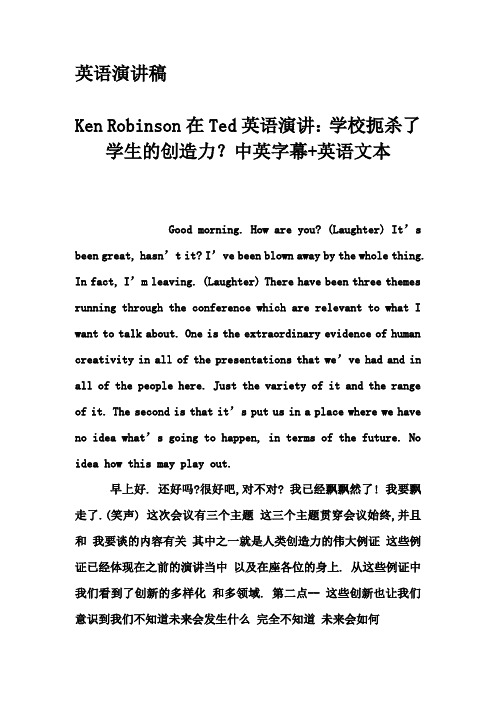
英语演讲稿Ken Robinson在Ted英语演讲:学校扼杀了学生的创造力?中英字幕+英语文本Good morning. How are you? (Laughter) It’s been great, hasn’t it? I’ve been blown away by the whole thing. In fact, I’m leaving. (Laughter) There have been three themes running through the conference which are relevant to what I want to talk about. One is the extraordinary evidence of human creativity in all of the presentations that we’ve had and in all of the people here. Just the variety of it and the range of it. The second is that it’s put us in a place where we have no idea what’s going to happen, in terms of the future. No idea how this may play out.早上好. 还好吗?很好吧,对不对? 我已经飘飘然了! 我要飘走了.(笑声) 这次会议有三个主题这三个主题贯穿会议始终,并且和我要谈的内容有关其中之一就是人类创造力的伟大例证这些例证已经体现在之前的演讲当中以及在座各位的身上. 从这些例证中我们看到了创新的多样化和多领域. 第二点-- 这些创新也让我们意识到我们不知道未来会发生什么完全不知道未来会如何I have an interest in education. Actually, what I find is everybody has an interest in education. Don’t you? I find this very interesting. If you’re at a dinner party, and you say you work in education -- Actually, you’re not often at dinner parties, frankly. (Laughter) If you work in education, you’re not asked. (Laughter) And you’re never asked back, curiously. That’s strange to me. But if you are, and you say to somebody, you know, they say, “What do you do?” and you say you work in education, you can see the blood run from their face. They’re like, “Oh my God,” you know, “Why me?”(Laughter) “My one night out all week.” (Laughter) But if you ask about their education, they pin you to the wall. Because it’s one of those things that goes deep with people, am I right? Like religion, and money and other things. So I have a big interest in education, and I think we all do. We have a huge vested interest in it, partly because it’s education that’s meant to take us into this future that we can’t grasp. If you think of it, children starting school this year will be retiring in 2065. Nobody has a clue, despite all the expertise that’s been on parade for the past four days, what the world will look like in five years’ time. And yet we’re meant to be educating them for it. So the unpredictability, I think,is extraordinary.我对教育感兴趣事实上,我发现每个人都对教育感兴趣难道不是吗? 我发现这很有趣如果你参加一个晚宴,你说你在教育部门工作坦白的讲,如果你在教育部门工作,事实上你不会经常参加晚宴, (笑声) 所以你不会被问及你是做哪行的。
关于学校如何扼杀创造力演讲稿
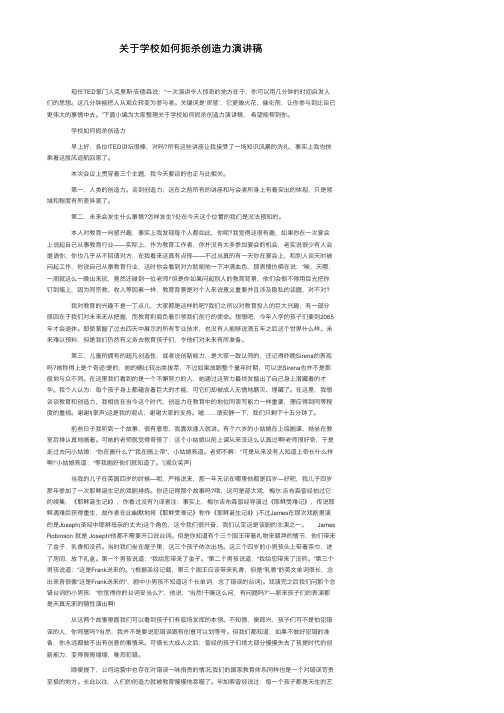
关于学校如何扼杀创造⼒演讲稿 现任TED掌门⼈克⾥斯·安德森说:“⼀次演讲令⼈惊奇的地⽅在于,你可以⽤⼏分钟的时间启发⼈们的思想。
这⼏分钟能把⼈从观众转变为参与者。
关键词是‘灵感’,它更像⽕花、催化剂,让你参与到⽐⾃⼰更伟⼤的事情中去。
”下⾯⼩编为⼤家整理关于学校如何扼杀创造⼒演讲稿,希望能帮到你。
学校如何扼杀创造⼒ 早上好,各位!TED讲坛很棒,对吗?所有这些讲座让我接受了⼀场知识风暴的洗礼,事实上我也快乘着这股风返航回家了。
本次会议上贯穿着三个主题,我今天要谈的也正与此相关。
第⼀,⼈类的创造⼒。
谈到创造⼒,这在之前所有的讲座和与会者所⾝上有着突出的体现,只是领域和程度有所差异罢了。
第⼆,未来会发⽣什么事情?怎样发⽣?处在今天这个位置的我们是没法预知的。
本⼈对教育⼀向感兴趣,事实上我发现每个⼈都如此,你呢?我觉得这很有趣,如果你在⼀次宴会上说起⾃⼰从事教育⾏业——实际上,作为教育⼯作者,你并没有太多参加宴会的机会,⽼实说很少有⼈会邀请你,你也⼏乎从不回请对⽅,在我看来这真有点怪——不过当真的有⼀天你在宴会上,和别⼈谈天时被问起⼯作,你说⾃⼰从事教育⾏业,这时你会看到对⽅脸刷地⼀下冲满⾎⾊,那表情仿佛在说:“唉,天哪,⼀周就这么⼀晚出来玩,竟然还碰到⼀位⽼师!”但是你如果问起别⼈的教育背景,他们会恨不得⽤⽬光把你钉到墙上,因为同宗教、收⼊等因素⼀样,教育背景是对个⼈来说意义重要并且涉及隐私的话题,对不对? 我对教育的兴趣不是⼀丁点⼉,⼤家都是这样的吧?我们之所以对教育投⼊的巨⼤兴趣,有⼀部分原因在于我们对未来⽆从把握,⽽教育则肩负着引领我们前⾏的使命。
想想吧,今年⼊学的孩⼦们要到2065年才会退休。
即使掌握了过去四天中展⽰的所有专业技术,也没有⼈能够说清五年之后这个世界什么样。
未来难以预料,但是我们仍然有义务去教育孩⼦们,令他们对未来有所准备。
第三,⼉童所拥有的超凡创造性,或者说创新能⼒,是⼤家⼀致认同的,还记得昨晚Sirena的表现吗?她称得上是个奇迹!是的,她的确⽐较出类拔萃,不过如果放眼整个童年时期,可以说Sirena也并不是那般地与众不同。
Doesschoolkillcreativity学校是否扼杀创造力英语作文演讲稿(精选五篇)

Doesschoolkillcreativity学校是否扼杀创造力英语作文演讲稿(精选五篇)第一篇:Does school kill creativity 学校是否扼杀创造力英语作文演讲稿Does school kill creativity? Good morning, ladies and gentlemen.It’s my honor to stand here to share my ideas.To be honest, I have deep feelings about today’s problem: Does school kill creativity?It's a little bit extreme to say that the school kills the creativity of the students, and creativity is one of the attributes of the brain in my opinion.However, the low end of the education will greatly limit the development of students' creativity.The biggest enemy of restricting the development of creativity is the standard answer!But do not worry, the standard answer seems to stifle the creativity of students, in fact, there is no problem, there will be no answer.So it is not wise to say the problem? Otherwise, we have a lot of teachers in fact, the problem is that if they have a lot of divergent thinking of the subject, who will give those divergent answers to a fair score?Fair,this is a very important question.Macroscopically speaking, our education has two different purposes: one is to choose the best, but to educate people.The two seemingly inseparable, but there are some inherent contradictions and cation is the key to knowledge and wisdom tradition, namely teaching.I hope that all students can enjoy a fair education and examination Resources, I also hope that those students with unusual creativity can get the creative education they deserve and the corresponding selection criteria.Oureducation system is predicated on the idea of academic ability.And there's a reason.Around the world, there were no public systems of education, really, before the 19th century.They all came into being to meet the needs of industrialism.So the hierarchy is rooted on two ideas.Firstly, that the most useful subjects for work are at the top.So you were probably steered benignly away from things at school when you were a kid, things you liked, on the grounds that you would never get a job doing that.Is that right? Don't do music, you're not going to be a musician;don't do art, you won't be an artist.Benign advice--now, profoundly mistaken.The whole world is engulfed in a revolution.And the second is academic ability, which has really come to dominate our view of intelligence, because the universities designed the system in their image.If you think of it, the whole system of public education around the world is a protracted process of university entrance.And the consequence is that many highly-talented, brilliant, creative people think they're not, because the thing they were good at school wasn't valued, or was actually stigmatized.And I think we can't afford to go on that way.But I only know where the problem is, but I don't know what the solution to the creative problem is.Fortunately, however, they do not have the ability to stifle my creativity, I am not bound by the habit of other people's thinking has been maintained to the present, but also in the continuous development of.I hope that some readers in the solution, to play, to break the shackles of examination oriented education, because through these, you can fly freely.Thank you.第二篇:学校是否扼杀创造力演讲稿所谓创造力就是指创造新东西的能力,这种新东西包括新的思想,新的艺术品,新的观点,新的产品,新的理论。
学校扼杀创造力发言稿(3篇)

第1篇大家好!今天,我站在这里,想就一个话题与大家共同探讨——学校是否扼杀了我们的创造力。
近年来,随着社会的发展,创新与创造力的培养越来越受到重视。
然而,在我国的学校教育中,是否存在着扼杀创造力的现象呢?我认为,这个问题值得我们深思。
首先,让我们来看看学校教育在培养创造力方面所面临的困境。
一、应试教育的束缚在我国,应试教育一直占据着主导地位。
学校教育过分注重学生的考试成绩,而忽视了对学生综合素质的培养。
在这种教育模式下,学生们为了追求高分,往往将精力集中在背诵和做题上,而忽视了独立思考和创造力的培养。
长此以往,学生们逐渐形成了依赖心理,缺乏独立解决问题的能力。
二、课程设置单一当前,我国学校教育在课程设置上存在一定程度的单一性。
许多学校课程以传授知识为主,缺乏实践性和趣味性。
这样的课程设置不利于激发学生的兴趣,更难以培养学生的创造力。
此外,一些学校过分强调学科知识的灌输,忽视了学生跨学科、跨领域的学习和探索。
三、评价体系的局限性在评价体系方面,我国学校教育过分依赖考试成绩。
这种评价方式使得学生们为了追求高分而忽视了创造力的培养。
同时,评价体系过于注重学生的学术成绩,忽视了学生的个性发展和综合素质。
四、师资力量的不足在师资力量方面,一些学校的教师队伍存在专业素质不高、创新意识不强的问题。
这导致教师在教学中难以激发学生的创造力,甚至在一定程度上抑制了学生的创造力。
针对以上问题,我认为可以从以下几个方面着手,培养我们的创造力:一、改革应试教育我们要逐步改变应试教育的现状,注重学生的综合素质培养。
学校应将评价体系从单一的考试成绩转变为多元化的评价方式,关注学生的创新精神、实践能力和综合素质。
二、丰富课程设置学校应优化课程设置,增加实践性、趣味性强的课程,让学生在轻松愉快的氛围中学习。
同时,鼓励学生跨学科、跨领域的学习,培养他们的创新思维。
三、完善评价体系学校应建立科学、合理的评价体系,关注学生的个性发展和综合素质。
学校扼杀创造力演讲稿

学校扼杀创造力演讲稿
1、引言
创造力是人类进步的关键驱动力,然而在学校教育中,却存在着一些可能扼杀学生创造力的因素。
2、学校教育中扼杀创造力的表现
21 标准化的教学模式
过度强调统一的课程、教材和考试标准,限制了学生的个性化思考和创新能力的发展。
22 缺乏鼓励冒险和失败的氛围
学生害怕犯错,因为错误往往被视为失败而不是学习的机会。
23 过度的竞争压力
排名和比较导致学生专注于迎合标准,而不是追求独特的创意和想法。
3、学校教育扼杀创造力的影响
31 限制学生的个人发展
无法充分发掘自身的潜力和兴趣,影响未来的职业选择和个人成就。
32 对社会创新的阻碍
培养出的学生缺乏创新思维,不利于社会的进步和发展。
4、应对学校扼杀创造力的策略
41 改革教学方法
采用多样化的教学方式,如项目式学习、探究式学习等,激发学生的主动思考和创新能力。
42 营造宽松的学习环境
鼓励学生尝试新事物,接受失败,并从失败中汲取经验。
43 调整评价体系
减少对标准化考试的依赖,更多地关注学生的综合能力和创新成果。
5、结语
学校应当认识到培养学生创造力的重要性,并积极采取措施改变现状,为学生的未来发展和社会的进步创造更有利的条件。
以上是为您起草的关于学校扼杀创造力的演讲稿内容,您可以根据
实际需求进行调整和修改。
学校扼杀创造力发言稿
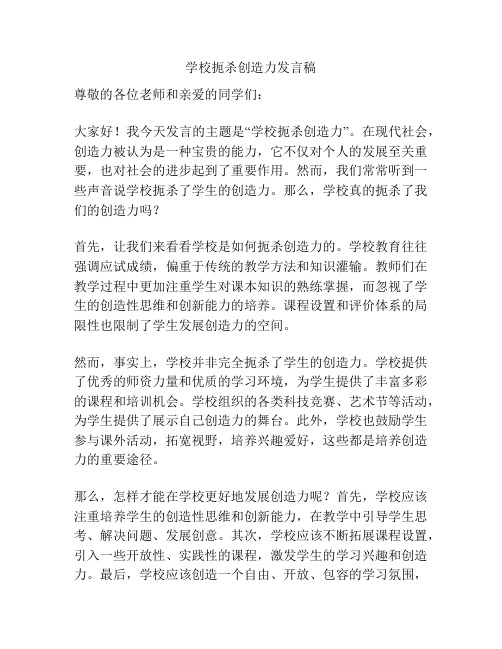
学校扼杀创造力发言稿尊敬的各位老师和亲爱的同学们:大家好!我今天发言的主题是“学校扼杀创造力”。
在现代社会,创造力被认为是一种宝贵的能力,它不仅对个人的发展至关重要,也对社会的进步起到了重要作用。
然而,我们常常听到一些声音说学校扼杀了学生的创造力。
那么,学校真的扼杀了我们的创造力吗?首先,让我们来看看学校是如何扼杀创造力的。
学校教育往往强调应试成绩,偏重于传统的教学方法和知识灌输。
教师们在教学过程中更加注重学生对课本知识的熟练掌握,而忽视了学生的创造性思维和创新能力的培养。
课程设置和评价体系的局限性也限制了学生发展创造力的空间。
然而,事实上,学校并非完全扼杀了学生的创造力。
学校提供了优秀的师资力量和优质的学习环境,为学生提供了丰富多彩的课程和培训机会。
学校组织的各类科技竞赛、艺术节等活动,为学生提供了展示自己创造力的舞台。
此外,学校也鼓励学生参与课外活动,拓宽视野,培养兴趣爱好,这些都是培养创造力的重要途径。
那么,怎样才能在学校更好地发展创造力呢?首先,学校应该注重培养学生的创造性思维和创新能力,在教学中引导学生思考、解决问题、发展创意。
其次,学校应该不断拓展课程设置,引入一些开放性、实践性的课程,激发学生的学习兴趣和创造力。
最后,学校应该创造一个自由、开放、包容的学习氛围,让学生有机会表现自己的创造力,充分发挥他们的潜能。
在结束之前,我希望大家明白学校并非完全扼杀了学生的创造力。
学校是学习和成长的地方,是培养和发展学生综合能力的重要场所。
我们应该积极参与学校的各项活动,努力发展自己的创造力,并在学校中为培养创造力提出建设性的建议。
谢谢大家!。
学校扼杀创造力演讲稿
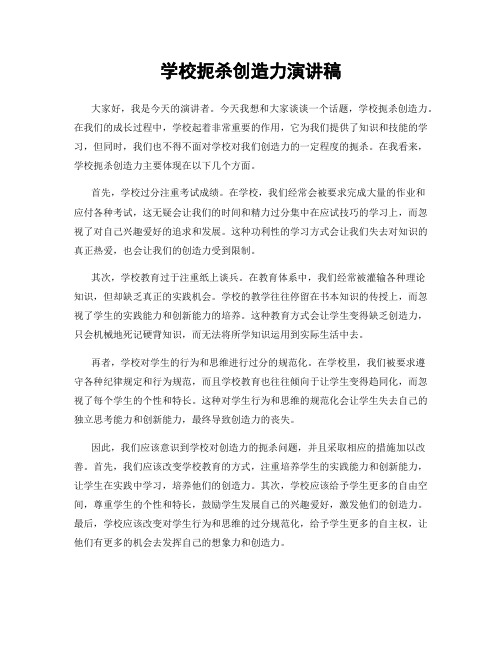
学校扼杀创造力演讲稿大家好,我是今天的演讲者。
今天我想和大家谈谈一个话题,学校扼杀创造力。
在我们的成长过程中,学校起着非常重要的作用,它为我们提供了知识和技能的学习,但同时,我们也不得不面对学校对我们创造力的一定程度的扼杀。
在我看来,学校扼杀创造力主要体现在以下几个方面。
首先,学校过分注重考试成绩。
在学校,我们经常会被要求完成大量的作业和应付各种考试,这无疑会让我们的时间和精力过分集中在应试技巧的学习上,而忽视了对自己兴趣爱好的追求和发展。
这种功利性的学习方式会让我们失去对知识的真正热爱,也会让我们的创造力受到限制。
其次,学校教育过于注重纸上谈兵。
在教育体系中,我们经常被灌输各种理论知识,但却缺乏真正的实践机会。
学校的教学往往停留在书本知识的传授上,而忽视了学生的实践能力和创新能力的培养。
这种教育方式会让学生变得缺乏创造力,只会机械地死记硬背知识,而无法将所学知识运用到实际生活中去。
再者,学校对学生的行为和思维进行过分的规范化。
在学校里,我们被要求遵守各种纪律规定和行为规范,而且学校教育也往往倾向于让学生变得趋同化,而忽视了每个学生的个性和特长。
这种对学生行为和思维的规范化会让学生失去自己的独立思考能力和创新能力,最终导致创造力的丧失。
因此,我们应该意识到学校对创造力的扼杀问题,并且采取相应的措施加以改善。
首先,我们应该改变学校教育的方式,注重培养学生的实践能力和创新能力,让学生在实践中学习,培养他们的创造力。
其次,学校应该给予学生更多的自由空间,尊重学生的个性和特长,鼓励学生发展自己的兴趣爱好,激发他们的创造力。
最后,学校应该改变对学生行为和思维的过分规范化,给予学生更多的自主权,让他们有更多的机会去发挥自己的想象力和创造力。
总之,学校扼杀了学生的创造力是一个现实存在的问题,我们应该重视并采取相应的措施加以改善。
希望我们能够共同努力,为学生的创造力发展创造更好的环境。
谢谢大家!。
学校扼杀创造力演讲稿

学校扼杀创造力演讲稿尊敬的老师、亲爱的同学们:大家好!我今天想向大家谈谈一个让我们都十分关心和困扰的问题:学校扼杀创造力。
创造力是一个人的创造性思维和想象力的表现,是人类进步和社会发展的重要动力。
然而,许多人认为学校教育不能很好地培养学生的创造力,反而有些扼杀了他们的想象力和创造力。
首先,学校教育注重的是标准答案和固定的教学模式,追求学生的形式主义和机械记忆。
在这种教学环境下,学生被要求按照老师和教材的要求进行学习和思考,缺乏独立思考和创造的空间。
这种教学方式限制了学生自由的思维和创造力的发挥。
此外,学校评估和考试制度也是扼杀创造力的重要因素之一。
学生在学校中为了追求高分和升学率,往往过多地关注应试技巧和题目的答案,而忽略了培养创造力的重要性。
同时,高考和升学压力也使得学生缺乏时间和机会去发展自己的创造力,只顾学习应试内容,导致了创造力的消失。
然而,学校扼杀创造力并不是唯一的原因,家庭和社会环境也有一定的责任。
现如今,家长过度担心孩子的学业成绩和未来发展,过多地约束孩子的行动和想象力,使他们缺乏自由和创新的机会。
社会对知识分子和创造力的尊重不够,使得创造力不能得到应有的重视和鼓励。
那么,我们如何打破学校对创造力的扼杀呢?首先,我们要改变学校的教学方式,注重学生的思考能力和独立创造能力的培养。
老师应该成为学生的引导者和激励者,给予学生更多的自由和探索的空间,让他们有机会发挥自己的创造力。
其次,我们要改变评估和考试制度,减轻学生的压力,让他们更有时间和机会去培养自己的创造力。
可以采用多元化的评估方式,注重学生的综合能力和创新能力的发展。
此外,家长和社会也要给予孩子更多的自由和鼓励,让他们有机会去发展自己的创造力。
家庭和社会应该树立正确的价值观,尊重知识分子和创造力的重要性,为创造力的发展提供良好的环境和条件。
最后,我要呼吁每一个人,无论是老师、学生还是家长,都要共同努力,改变现状,让创造力重新焕发出光芒。
学校扼杀创造力作文

学校扼杀创造力作文篇一:TED 学校扼杀了我们的创造力TED演讲:学校扼杀了我们的创造力本视频网易公开课链接:v.163/movie/2006/2/V/E/M7SP3QUET_M7SP3T0VE.htmlWhat are you have is a person of extraodinary dedication who found a talent.We've all agreed on the really extraordinary capacity that children have, their capacities for innovation. And my contention is, all kids have tremendous talents and we squander them, pretty ruthlessly. So I want to talk about education and creativity. My contention is that creativity now is as important in education as literacy, and we should treat it with the same status.现在的教育提倡的是一个有风险精神的老师能发现一个天才学生。
我们一致认同,孩子拥有超凡的才能,或者说创新能力。
我认为:每个孩子身上都蕴含着巨大的才能,却被成人无情地磨灭了。
因此,我想谈谈教育和创造力。
我相信在当今这个时代,创造力在教育中的地位同读写能力一样重要,理应得到同等程度的重视。
I heard a great story recently, I love telling it, of a six-year-old girl who was in a drawing lesson. The teacher said usually this little girl hardly paid attention, but in this drawing lesson she did. The teacher was fascinated and she went over to her and said, “What are you drawing?” and the girl said, “I'm drawing a picture of God.” And the teacher said, “But nobody knows what God looks like.” And the girl said, “They will in a minute.”前些日子我听到了一个很棒的故事,我喜欢逢人就讲。
学校扼杀创造力发言稿
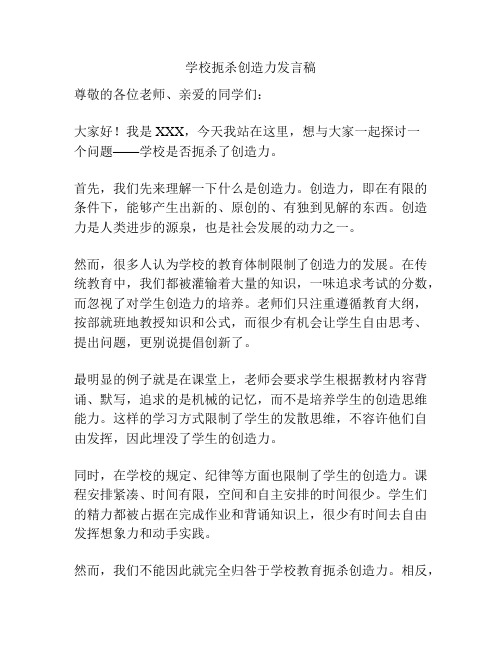
学校扼杀创造力发言稿尊敬的各位老师、亲爱的同学们:大家好!我是XXX,今天我站在这里,想与大家一起探讨一个问题——学校是否扼杀了创造力。
首先,我们先来理解一下什么是创造力。
创造力,即在有限的条件下,能够产生出新的、原创的、有独到见解的东西。
创造力是人类进步的源泉,也是社会发展的动力之一。
然而,很多人认为学校的教育体制限制了创造力的发展。
在传统教育中,我们都被灌输着大量的知识,一味追求考试的分数,而忽视了对学生创造力的培养。
老师们只注重遵循教育大纲,按部就班地教授知识和公式,而很少有机会让学生自由思考、提出问题,更别说提倡创新了。
最明显的例子就是在课堂上,老师会要求学生根据教材内容背诵、默写,追求的是机械的记忆,而不是培养学生的创造思维能力。
这样的学习方式限制了学生的发散思维,不容许他们自由发挥,因此埋没了学生的创造力。
同时,在学校的规定、纪律等方面也限制了学生的创造力。
课程安排紧凑、时间有限,空间和自主安排的时间很少。
学生们的精力都被占据在完成作业和背诵知识上,很少有时间去自由发挥想象力和动手实践。
然而,我们不能因此就完全归咎于学校教育扼杀创造力。
相反,学校同样给予了我们许多培养创造力的机会和温床。
学校举办各种科技创新活动,例如科技创新竞赛、学生社团等,为有创新精神的学生提供了展示自己才能的机会。
此外,学校也鼓励学生主动思考,解决问题的能力,很多课堂上会有与生活相关的思考题目,以及讨论的环节,让学生发挥自己的创造力。
要想真正发展创造力,我们不仅需要学校的努力,还需要学生们努力。
首先,学生们应该拥有强烈的自主学习的意识,不仅仅满足于老师传授的知识,还要主动地去探究、思考。
其次,学生们要勇于表达自己的观点和想法,在思考问题的过程中积极提出自己的独到见解,不断发挥自己的创造力。
同时,学生们也应该积极参与各种创新竞赛和活动,主动寻找展示自己才能的机会。
学校的确存在一些扼杀创造力的方面,但是我们不能仅把责任归咎于学校,学生们同样要做出我们自己的努力。
学校扼杀创造力
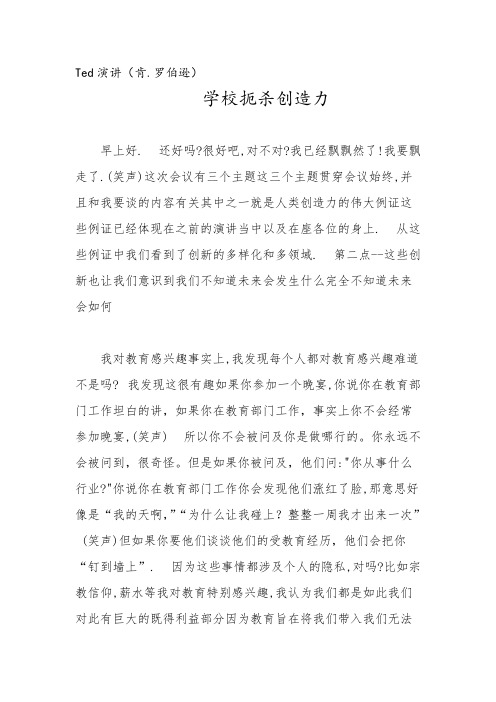
Ted演讲(肯.罗伯逊)学校扼杀创造力早上好. 还好吗?很好吧,对不对?我已经飘飘然了!我要飘走了.(笑声)这次会议有三个主题这三个主题贯穿会议始终,并且和我要谈的内容有关其中之一就是人类创造力的伟大例证这些例证已经体现在之前的演讲当中以及在座各位的身上. 从这些例证中我们看到了创新的多样化和多领域. 第二点--这些创新也让我们意识到我们不知道未来会发生什么完全不知道未来会如何我对教育感兴趣事实上,我发现每个人都对教育感兴趣难道不是吗? 我发现这很有趣如果你参加一个晚宴,你说你在教育部门工作坦白的讲,如果你在教育部门工作,事实上你不会经常参加晚宴,(笑声) 所以你不会被问及你是做哪行的。
你永远不会被问到,很奇怪。
但是如果你被问及,他们问:"你从事什么行业?"你说你在教育部门工作你会发现他们涨红了脸,那意思好像是“我的天啊,”“为什么让我碰上?整整一周我才出来一次” (笑声)但如果你要他们谈谈他们的受教育经历,他们会把你“钉到墙上”. 因为这些事情都涉及个人的隐私,对吗?比如宗教信仰,薪水等我对教育特别感兴趣,我认为我们都是如此我们对此有巨大的既得利益部分因为教育旨在将我们带入我们无法掌握的未来大家想想,今年入学的小孩2065将退休. 没人知道会怎样--虽然过去四天会议进程里都是关于这方面的专业讨论--但我们还是无法预知这个世界五年后的样子。
这就是为何我们要让这些孩子接受教育。
我认为正是未来的不确定性决定其非同寻常。
第三点就是我们都认同一个观点--这些孩子的特别之处正是他们的创新能力。
我觉得昨晚Sirena的表现令人惊奇,对吗?她很出色,但是我认为她在孩提时代时没显得与众不同。
现在的教育提倡的是一个有奉献精神的老师能发现一个天才学生。
但我认为所有孩子都是伟大的天才。
而我们却无情地扼杀了他们的才能。
所以我想谈谈教育和创造力。
我认为创造力和文化知识在教育中占同样比重,所以这两方面我们应同等对待。
TED演讲:学校扼杀了学生的创造性

TED演讲:学校扼杀了学生的创造性英国人,爵士,国际知名的创新、创造力与人力资源专家。
他是一名激情的演讲家,广受欢迎,善于以诙谐、激情与机智的方式传递深奥的知识,他告诉全世界的受众,在全球经济的新形势下,商业、教育与组织的需求如何变化。
下面是小编为大家收集关于TED演讲:学校扼杀了学生的创造性,欢迎借鉴参考。
中英对照演讲稿Good morning. How areyou?Its been great, hasnt it? Ive been blown away by the whole thing. Infact, Im leaving.There have been three themes running through the conferencewhich are relevant to what I want to talk about.早上好. 还好吗?很好吧,对不对? 我已经飘飘然了! 我要飘走了.(笑声) 这次会议有三个主题这三个主题贯穿会议始终,并且和我要谈的内容有关。
One is the extraordinaryevidence of human creativity in all of the presentations that weve had and inall of the people here. Just the variety of it and the range of it.其中之一就是人类创造力的伟大例证这些例证已经体现在之前的演讲当中以及在座各位的身上. 从这些例证中我们看到了创新的多样化和多领域.The secondis that its put us in a place where we have no idea whats going to happen, interms of the future. No idea how this may play out.第二点-- 这些创新也让我们意识到我们不知道未来会发生什么完全不知道未来会如何I have an interest ineducation. Actually, what I find is everybody has an interest in education.Dont you? I find this very interesting. If youre at a dinner party, and yousay you work in education -- Actually, youre not often at dinner parties,frankly.我对教育感兴趣,事实上,我发现每个人都对教育感兴趣难道不是吗? 我发现这很有趣如果你参加一个晚宴,你说你在教育部门工作坦白的讲,如果你在教育部门工作,事实上你不会经常参加晚宴,If you work in education,youre not asked.And youre never askedback, curiously. Thats strange to me. But if you are, and you say to somebody,you know, they say, "What do you do?"所以你不会被问及你是做哪行的。
学校扼杀创造力发言稿
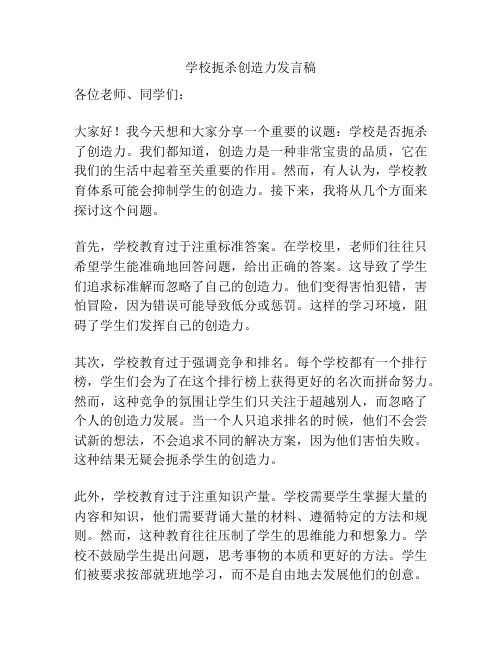
学校扼杀创造力发言稿各位老师、同学们:大家好!我今天想和大家分享一个重要的议题:学校是否扼杀了创造力。
我们都知道,创造力是一种非常宝贵的品质,它在我们的生活中起着至关重要的作用。
然而,有人认为,学校教育体系可能会抑制学生的创造力。
接下来,我将从几个方面来探讨这个问题。
首先,学校教育过于注重标准答案。
在学校里,老师们往往只希望学生能准确地回答问题,给出正确的答案。
这导致了学生们追求标准解而忽略了自己的创造力。
他们变得害怕犯错,害怕冒险,因为错误可能导致低分或惩罚。
这样的学习环境,阻碍了学生们发挥自己的创造力。
其次,学校教育过于强调竞争和排名。
每个学校都有一个排行榜,学生们会为了在这个排行榜上获得更好的名次而拼命努力。
然而,这种竞争的氛围让学生们只关注于超越别人,而忽略了个人的创造力发展。
当一个人只追求排名的时候,他们不会尝试新的想法,不会追求不同的解决方案,因为他们害怕失败。
这种结果无疑会扼杀学生的创造力。
此外,学校教育过于注重知识产量。
学校需要学生掌握大量的内容和知识,他们需要背诵大量的材料、遵循特定的方法和规则。
然而,这种教育往往压制了学生的思维能力和想象力。
学校不鼓励学生提出问题,思考事物的本质和更好的方法。
学生们被要求按部就班地学习,而不是自由地去发展他们的创意。
针对这个问题,我认为学校教育需要进行改革。
我们需要一个注重培养创造力的教育体系。
首先,老师们应该鼓励学生尝试新的想法和解决方案。
他们应该提醒学生,错误是成功的前奏,只有不断尝试,才能获得真正的创新。
其次,学校应该为学生提供充分的自由与自主权,让他们发展自己的兴趣和独特的才能。
最后,学校应该鼓励学生提出问题,思考和发现事物背后的本质。
总之,学校教育体系有时会扼杀学生的创造力发展。
然而,我们有责任改变这种状况。
只有通过创造力的培养,我们才能更好地应对未来的挑战。
让我们悉心关注学生的创造力,让他们发挥无限的想象力,创造出更美好的世界。
谢谢大家!。
学校扼杀创造力发言稿

学校扼杀创造力发言稿大家好!我是XXX,今天我想要和大家一起探讨的是学校是否扼杀了创造力。
首先,我想明确一下,创造力是指通过独特且有创意的思维方式,产生新的观念、创造出新的东西的能力。
换句话说,创造力是我们在学习和生活中提出新的解决问题的方法,提供新的思维方式和创新的机会。
然而,很多人认为学校存在一定的扼杀创造力的现象。
那么,学校到底是如何扼杀创造力的呢?首先,学校课程设置的单一和刻板认知对于创造力的发展不利。
大部分学校课程都是按照学科和学科内容划分的,很少有交叉学科和综合学科的设置。
学生需要按照既定的发展路径,学习规定的内容。
这样的学习方式会让学生局限在一个狭窄的学科范围内,难以有机会接触到其他领域的知识。
刻板的认知也会限制学生的思维方式和创造力的发展,要求学生只能按部就班地学习,缺乏自主探索和创新的机会。
其次,学校过于强调考试和分数,给学生带来了巨大的压力。
学生们被迫把大部分时间都花在应试学习上,为了追求高分而不得不死记硬背大量的知识点。
这样的学习方式强调的是记忆和重复,而不是思考和创新。
学生们为了应对压力,会选择走捷径,寻求简单而刻板的答案,而不是积极思考和探索。
这种应试教育模式不仅扼杀了学生的创造力,也无法培养学生的实际应用能力。
此外,学校缺乏提供多样化的学习环境和实践机会。
学校的学习环境往往是固定的,学生们需要按照规定的时间和地点进行学习。
这样的环境缺乏了创新和多样性,无法激发学生的创造力。
与此同时,学生们在学校中也缺乏实践机会。
很多学校的实践活动往往被限制在实验室和课堂中,学生们难以接触到真实的社会问题和挑战。
缺乏实践机会使得学生们无法将理论知识应用于实际,无法锻炼实际解决问题的能力。
那么,如何解决学校扼杀创造力的问题呢?首先,需要改变教育模式和课程设置。
学校应该鼓励学生多学科交叉学习和综合学科的探索,让学生们有机会接触到各个领域的知识。
教师也需要在教学中注重培养学生的思维能力和创造力,引导学生进行发散性思考和自主探索。
学校扼杀创造力发言稿

学校扼杀创造力发言稿《学校扼杀创造力》各位老师、同学:大家好!今天我想和大家聊聊一个让人有些头疼的话题——学校是否扼杀了创造力。
先来讲讲我自己的经历吧。
记得那是一堂美术课,老师让我们画一幅自己心目中的春天。
我可兴奋了,因为春天在我心里那是五彩斑斓、充满生机的。
我想象着有嫩绿的小草从土里探出脑袋,五颜六色的花朵争奇斗艳,还有那蓝天下飘着的几朵像棉花糖一样的白云。
于是,我拿起画笔,大胆地用各种色彩涂抹起来。
我画了一条粉色的河流,因为在我看来,春天的河流就应该是带着浪漫和温柔的。
我还画了一棵金色的大树,树上挂满了像星星一样闪闪发光的果实。
可当我满心欢喜地把画交上去时,老师的表情却让我的心一下子凉了半截。
她皱着眉头,一脸严肃地说:“河流怎么会是粉色的?大树怎么可能是金色的?你这完全不符合现实!”然后,她给了我一个不太高的分数。
那一刻,我觉得特别委屈。
我在想,为什么一定要按照现实中的样子来画呢?我心中的春天就是这样充满了奇幻和想象的呀。
这还只是一件小事,在学校里,类似的情况还有很多。
比如写作文,老师总是强调要有固定的结构和套路。
开头要怎么引题,中间要怎么论述,结尾要怎么总结,好像每一篇作文都得像一个模子里刻出来的一样。
如果我们想要尝试一些新的写作方式,或者表达一些独特的观点,很可能就会被认为是“跑题”或者“不够规范”。
还有数学考试,明明有些题目可以有多种解题方法,但只要和标准答案不一样,就会被扣分。
难道就不能鼓励我们去探索不同的思路吗?学校里的课程安排也是满满的,从早到晚,几乎没有多少自由支配的时间。
我们就像被关在一个无形的笼子里,按照规定好的路线前进。
有时候,我真的很想停下来,去观察一下校园里那只忙碌的小蚂蚁,或者抬头看看天上变幻的云彩,可根本没有这样的机会。
再说说兴趣小组吧。
本来参加兴趣小组是为了发展自己的爱好,发挥创造力。
但很多时候,兴趣小组也变得很功利,只是为了参加比赛拿奖,而不是真正让我们享受创造的过程。
- 1、下载文档前请自行甄别文档内容的完整性,平台不提供额外的编辑、内容补充、找答案等附加服务。
- 2、"仅部分预览"的文档,不可在线预览部分如存在完整性等问题,可反馈申请退款(可完整预览的文档不适用该条件!)。
- 3、如文档侵犯您的权益,请联系客服反馈,我们会尽快为您处理(人工客服工作时间:9:00-18:30)。
所谓创造力就是指创造新东西的能力,这种新东西包括新的思想,新的艺术品,新的观点,新的产品,新的理论。
这种能力主要体现在发散思维的能力和逆向思维能力方面。
当然,它要以一定的基础知识与学习能力作为前提。
而学校就是一个提供基础知识与教师资源的平台。
如果没有基础知识,一个对天文抱有求知欲的孩子如何计算复杂的公式;如果没有基础知识,一个对音律充满天赋的天才如何谱出优美的曲子;如果没有基础知识,乔布斯如何开始研发自己的第一台电脑并逐渐走向世界。
显然,学校开设基本的课程是以教基础知识为手段、以达到训练学生的思维能力和创新能力为目的的。
The so-called creativity is the ability to create new things, including new ideas, new works of art, new ideas, new products, new theories.This ability is mainly reflected in the ability of divergent thinking and reverse thinking ability.Of course, it must be based on a certain basic knowledge and learning ability as a precondition.The school is a platform which provides basic knowledge and teacher resources . If school dose not teach basic knowledge,how can A child who is curious about astronomy calculate a complex formula; if ~~~~,how can A genius who is talented in music compose a beautiful song; if ~~~, how can Jobs began his first computer and gradually shared it toward the world. Obviously,the reason why school offers basic courses is to teach basic knowledge as a means and to train students' thinking ability and innovation ability as the goal.学生在参与学校活动时,除了松弛学业压力,还可以开拓视野,锻炼多方面的才能,见多才能识广。
比如,由具有共同兴趣、爱好和特长的同学组成的社团,开展丰富多彩的社团文化活动,让学生在活动中发现与培养自己多方面的兴趣、能力及创造力,从而有效地促进学生心理的健康发展。
著名节目主持人撒贝宁就是这样的一个例子。
从小到大都被艺术熏陶的他,初中二年级,在一次不经意参加的演讲比赛之后,热爱上了演讲。
高三那年,撒贝宁有幸去参加了北京大学举办冬令营,在汇报演出中以一曲《小白杨》顺利通过了汇演。
在离高考还有三个月,他接到了北京大学的录取通知书。
大二搞戏剧社,还拍电视剧,获得了中央台“理想杯”二等奖,大三作为合唱团团长率队远征西班牙,在国际比赛中勇夺第一······可见,参加学校活动推动学生个人个性化与创造力的发展。
丰富多彩的文化活动能培养学生的兴趣、能力及创造力。
Students participate in school activities, not only can they relieve their academic pressure, but also can broaden their horizons,and exercise their ability in many aspects widely. For example,students who have common interests, hobbies and expertise establish their clubs,carry out rich and colorful club activities, let students find and train themselves in terms of interest, ability and creativity, so as to promote the development of students effectively.The famous host Sa Beining is an example of this. On the second grade of junior high school, after he once participated in a speech contest, he loved on it. On the senior 3, he had to go to a winter camp which held by the Peking University ,after that he was admitted into the Peking University.In his second year at theuniversity ,he joined the drama club and played a role in a TV series, then on the third year, as a head of the choir, he led his team to join in a International competition and won the first one in Spain.It is clear that participating in school activities promote the development of students' individual personality and creativity. Rich and colorful cultural activities can cultivate students' interest, ability and innovation .除此之外,最重要的是学校能够营造一种合作与交流的文化氛围。
老师与学生是学校里最宝贵的一种资源。
在一种融洽的师生氛围中,学生更敢于说话、乐于说话,表露自己的心声,发表自己的观点和想法,从而不断激发创新思维。
再比如现在的新课程改革,增加了“活动课”、“选修课”等,在教学实践中重视学生生动、活泼、主动地学习,重视学生成功与发展的经验,倡导了新的教育观念,激活了学生的创造力与实践能力。
这是学校教育的进步,也是学校内合作与交流的重要性的体现。
创新是一个民族进步的灵魂,是一个国家兴旺发达的不竭动力,也是衡量新时期人才素质高低的重要标准。
毕加索曾说过每一个孩子都是天才。
的确,学生内在的创造潜力是巨大的,用积极的方式培养学生的创造力有着极其深远的意义。
学校并不必然会扼杀创造力。
学校只是激发创造力的一个平台或途径。
因此,学生更应当在学校生活做到中积极思考、合作包容,来形成一种自我独特的创造力。
The most important is the school can create\build a cooperation and exchange of cultural atmosphere. The teachers and students is the most valuable resources of schooling. In a harmonious atmosphere for the teachers and students, students are more willing to speak, dare to speak, and to express their feelings, opinions and ideas, in order to inspire a innovative thinking.For instance the new curriculum reform now, it increases the "activities", "elective" class,in the teaching practice, students learn more vividly, lively and actively . It activates the students' creativity and practical ability. This is a progress of the school Education and also reflected in the importance of cooperation and exchanges in the school.Innovation is the soul of a nation's progress, is an inexhaustible motive force for the prosperity of a country, but also an important standard to measure the quality of talents in the new age. Picasso once said that every child is a artists. Indeed, their intrinsic creative potential is enormous, cultivating students' creativity in a positive way is of a further significance. The school does not necessarily kill creativity.School is just a platform or way to stimulate creativity. Therefore, students should do more positive thinking、cooperation and communication in the school life, to form a unique creativity.。
